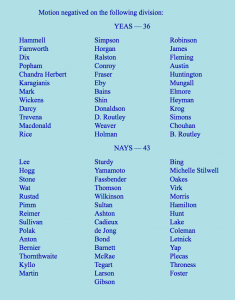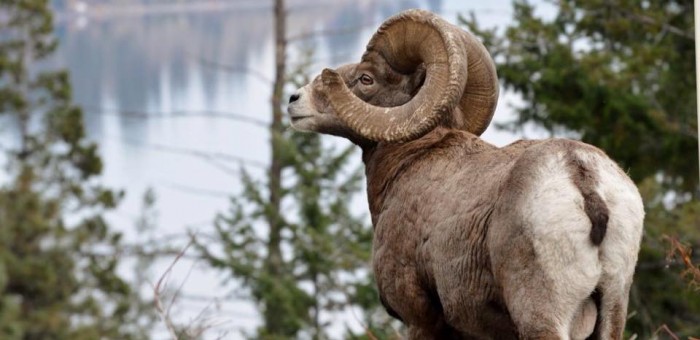Standing up for Resident Hunters over Foreign Trophy Hunters
Today in the legislature I introduced Bill M234 — Wildlife Amendment Act, 2017.
This bill combined two previous bills that I had introduced in the legislature. The BC Liberals did not wish to bring either of these to second reading. The first Bill was to designed to reduce the preferential treatment of non-resident hunters by eliminating the minister’s discretion to make separate rules for resident and foreign hunters when it comes to obtaining LEH permits. This bill requires all hunters to enter a lottery for their LEH tags, as is done in other jurisdictions.
The second Bill I had already introduced was designed to ensure that all edible portions of animals hunted in British Columbia are taken to the hunter’s domicile. In addition, the proposed changes remove grizzly bears from the list of animals exempt from meat harvesting regulations. These put in place a major logistical barrier to foreign trophy hunting.
Two new additions were included in the updated bill. I am grateful to the feedback I received on my earlier bills that led to these modifications. First, if passed this bill would require that edible portions be packed out prior to, or in conjuction with, any other body parts of the game carcass. This is consistent with the notion is that hunting is primarily for food and the the trophy should be viewed as a by-catch.
The second addition would disallow those convicted of fisheries or wildlife offences from becoming fishing or hunting guides in the province of British Columbia.
Below I reproduce the text and video on my introduction along with the accompanying press release .
Text of the Introduction
A. Weaver: I move that a bill intituled Wildlife Amendment Act, 2017, of which notice has been given in my name on the order paper, be read a first time now.
Motion approved.
A. Weaver: It gives me great pleasure to introduce this bill that, if enacted, would make a number of changes to the Wildlife Act.
This bill restricts the practices of non-resident trophy hunters who come to B.C. to kill large game by making three specific amendments to the Wildlife Act. The proposed changes remove grizzly bears from the list of animals exempt from meat harvesting regulations, ensures all edible portions of animals killed in B.C. are taken directly to a hunter’s residence, and requires the meat to be taken out first, before the hide or head.
This bill also stops government from letting non-resident hunters buy preferential access to limited-entry hunting permits and bans people convicted of fisheries or wildlife offences from becoming fishing or hunting guides in the province of British Columbia.
For local sustenance hunters, the vast majority of hunters in B.C. that is, this bill merely echoes what they are already doing — harvesting wild game to bring the meat home to feed their families. For non-resident trophy hunters coming to B.C. to hunt an animal only for its hide, skull or antler, this bill puts in place a significant logistical challenge.
Bill M234, Wildlife Amendment Act, 2017, introduced and read a first time.
A. Weaver: At this time, I move, pursuant to standing order 78a, that this bill be referred to the Select Standing Committee on Parliamentary Reform, Ethical Conduct, Standing Orders and Private Bills for immediate review.
Madame Speaker: I will point out that that’s a departure in practice.
All those in favour? Nay is heard. Division has been called.
 A. Weaver: May I have this referred to second reading — a motion to do so?
A. Weaver: May I have this referred to second reading — a motion to do so?
Bill M234, Wildlife Amendment Act, ordered to be placed on orders of the day for second reading at the next sitting of the House after today.
Video of the Introduction
Media Release
Weaver tables Wildlife Amendment Act to Committee Stage – Liberals vote Nay
For immediate release
March 6th, 2017
VICTORIA B.C. – Today in the legislature MLA Andrew Weaver tabled the Wildlife Amendment Act directly to committee stage, leading to an immediate vote in the House. Weaver and the B.C. NDP voted in favour of moving the bill directly to committee stage for review. The B.C. Liberals voted against it.
“This bill works to ensure that sustainable, respectful sustenance hunting in British Columbia is grounded in a science-based conservation policy and that the interests of residents hunters are put ahead of foreign trophy hunters.
“It is clear these are values the B.C. Liberals do not share – as illustrated by their vote against further consulting on this bill today. But, I am glad to see that the B.C. NDP support my initiatives on this file,” says Weaver.
The bill would restrict the practices of non-resident trophy hunters who come to B.C. to hunt large game by making three specific amendments to the Wildlife Act. The proposed changes remove grizzly bears from the list of animals exempt from meat harvesting regulations, ensures all edible portions of animals killed in B.C. are taken directly to the hunter’s residence, and requires the meat to be taken out first – before the hide or head. For non-resident trophy hunters coming to B.C. to hunt an animal solely for its hide, skull, or antlers this puts in place a prohibitive logistical challenge.
The bill also stops the government from letting non-resident hunters buy preferential access to limited-entry-hunt permits. And lastly, it bans people convicted of fisheries or wildlife offenses in B.C. and other jurisdictions from becoming fishing or hunting guides.
– 30 –
Media contact
Mat Wright, Press Secretary
+1 250-216-3382 | mat.wright@leg.bc.ca





9 Comments
The Yukon and Alaska already have meat first language in their regulations. It just formalizes what ethical hunters are already doing so it doesn’t hamstring or hinder anyone that matters. The precise language the Yukon uses is “Successful hunters are required to take all of the meat from the kill site to the departure
point (the place where it will be transported from the field) before taking the horns or antlers of the animal to that point. If all the meat is to be transported at once, horns or antlers may be taken with that meat, or horns or antlers may be taken with the last load of meat. Any meat left behind once the horns or antlers are removed from the kill site is considered abandoned.”
This legislation would make BC the only jurisdiction in the world to mandate grizzly bear meat retention. Neither Alaska nor the Yukon require the meat from grizzlies to be retained.
BC already has meat retention laws for ungulates.
The only thing this bill is intended to do, is be the first step in closing a lawful, science based, highly managed hunt.
Mr Weaver, it is clear that you have no idea of how hunting works in this province. Non Resident aliens do not compete with resident hunters for limited entry permits. The gov’t sets aside a portion of the allowable harvest in any given management unit for resident hunters. This portion of the allowable harvest goes into a limited entry draw that any resident hunter can apply for, regardless of where they live in BC.
Another portion of the allowable harvest is granted to guide outfitters in that management unit. The outfitters that have tenure in that zone have set potential numbers of animal authorizations available. It is up to them to find a hunter willing to pay their hunt price to try and harvest an animal under that allocation for that species. That is open to any hunter who has the money to pay the guide, regardless of where they live in the world, BC included….
You have spoken elsewhere of how your bill is modeled after “the Montana system”. I fear that you have NO IDEA how that works. In Montana, if an animal is under a draw system, a hunter may apply and win that draw. Then they have to employ a guide who has a licence in Montana, even if that guide has never seen that particular animal, or ever been to that particular unit, or maybe hasn’t even been to that state….
Any guide with a Montana licence can then sucker in the successful applicant to go to their drawn unit zone to hunt. That isn’t how it works in BC. Outfitters here have set zones to which they have exclusive rights in a given management zone. Your bill will merely add unneccessary red tape to a viable system already in place for no real reason.
Your meat retention bill merely hamstrings resident hunters, and won’t really cripple trophy hunters as is your intention. A non resident hunter is already hunting with an outfitter, who has the infrastructure in place to deal with a meat first law. They have horses, teams of young guys with backpacks, boats, and planes already in place to handle this. Someone who is coming to BC to hunt for a Stone sheep or bull moose isn’t going cringe at spending another few hundred dollars on some coolers and some dry ice when they are already spending $10 000 to $50 000 US to come experience BC.
Please, please, educate yourself on the systems currently in place before you start trying to make changes to systems in place already.
Well said Dave. Mr. Weaver clearly has no idea about non resident hunting or how the leh process is structured. It’s people like Mr. Weaver that end up ruining hunting for residents because he’s too concerned about keeping non residents out.
Any resident hunter that is in favour of this bill needs to do their own research instead of just taking a politicians word for it.
Maybe it’s time to stop trophy hunting altogether, and limit hunting to purposes of food procurement and protection of humans and livestock, which should be strictly limited according to species populations in given regions. For example, in our area, the Cariboo, the moose population has decreased substantially recently, so I think they should not be hunted here until their numbers increase to a healthy level. I would be surprised if any of the people who kill moose in this area NEED moose meat to survive.
Well done, thank you!
I think this is a fantastic bill.
Thank you for looking out for the bc hunting residents & the animals .
I fully agree with both bills. Good luck! Wildlife comes first. Resident hunters second and non residents last!
Keep up the good work as a hunting family we appreciate what you are doing for us here in bc THANK YOU!!